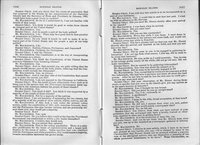1066-1067
| Previous Page | Next Page |

|
Senator Gray. And you think that the treaty of annexation that was proposed to the Senate by the commissioners of the Hawaiian Islands and the Secretary of State and President, in January, 1893, would have been a good treaty to confirm?
Mr. MacArthur. So far as I understand it; I am not familiar with details of that treaty.
Senator Gray. You think it would be good to make those islands an integral part of the United States?
Mr. MacArthur. Yes.
Senator Gray. And its people a part of the body politic?
Mr. MacArthur. I do. There may be a good deal in that question of annexation to California.
Senator Gray. Do you think it would be well to make it an integral part of the United States and the people a part of our body politic?
Mr. MacArthur. I do.
Senator Gray. Natives, Chinese, Portuguese, and Japanese?
Mr. MacArthur. Certainly the Portuguese.
Senator Gray. I said the Chinese.
Mr. MacArthur. Our Constitution is in the way of incorporating the Chinaman as a citizen.
Senator Gray. You think the Constitution of the United States prevents Chinamen from becoming citizens?
Mr. MacArthur. Yes.
Senator Gray. And on that account you are quite willing that the people should become part of the body politic, believing that the Constitution would exclude the Chinamen?
Mr. MacArthur. Yes; as citizens.
Senator Gray. And it was that view of the Constitution that caused you to make the answer you did?
Mr. MacArthur. I am not opposed to the Chinaman in California.
Senator Gray. Was the result of your observation there such as to bring you to the opinion that the Provisional Government fairly represented in the American fashion the people of those islands?
Mr. MacArthur. Yes.
Senator Gray. You think it did? You think it was supported by a majority of the people of those islands?
Mr. MacArthur. Not by a majority of the natives.
Senator Gray. I am not speaking of separating the two classes, but of a majority of all the people of those islands, whites, natives, and all.
Mr. MacArthur. If they took a vote under the present voting system, under the constitution of 1887, with American interests there, and the Portuguese who may become citizens, and are practically citizens there now, they would get a majority.
Senator Gray. Now?
Mr. MacArthur. Yes; now.
Senator Gray. Do you believe they would at the time the Provisional Government was established or within a few weeks thereafter?
Mr. MacArthur. I believe they would now.
Senator Gray. Do you extend that opinion?
Mr. MacArthur. That is the voting population. There is a property qualification for the house of representatives and a larger qualification for the house of nobles. Taken together, that vote, combined with the Portuguese and white population, they would secure a majority, because annexation sentiment has grown lately.
|
Senator Gray. I am told that this article is to be incorporated as a part of your testimony.
Mr. MacArthur. Yes. I would like to omit that last part. I wind up with an allusion to Mr. Stevens.
Senator Gray. Did you meet Mr. Blount shortly after your arrival in the islands?
Mr. MacArthur. I was there when he arrived.
Senator Gray. Did you meet him?
Mr. MacArthur. Yes.
Senator Gray. Did you see him constantly?
Mr. MacArthur. Every day while I was there. I went down to Mauai, made excursions to the volcano and came back, and would see Mr. Blount every day while in Honolulu.
Senator Gray. You have already told me that you met Mr. Blount directly after his arrival, and boarded at his hotel, and that you saw him every day?
Mr. MacArthur. Yes.
Senator Gray. Did he seem to you to be engaged in gathering information? I do not say from what source; I just say, did he seem to be about that business?
Mr. MacArthur. He was, so far as I could ascertain. Yes; he was in his cottage pretty nearly all the while; did not go out any; did not make excursions.
Senator Gray. But he seemed to be gathering information?
Mr. MacArthur. Yes; that was about the purport of it.
Senator Gray. Did he seem to be honestly engaged in it?
Mr. MacArthur. Yes; except that he would not see some men at first like Lobenstein, who had been a surveyor and knew all about the land system. After he saw him he said he was the best man he could get-have you any more such men?
Senator Gray. Did your observation of Mr. Blount during those weeks or months that you were on the islands give you any opinion as to the man's honesty or integrity?
Mr. MacArthur. Yes; I thought he was honest.
Senator Gray. Did you think he was an upright man?
Mr. MacArthur. Yes, I do-ordinarily so.
Senator Gray. A gentleman?
Mr. MacArthur. Yes.
Senator Gray. I mean in the wide, broad acceptation of that term?
Mr. MacArthur. Oh, yes.
Senator Gray. He did not, I assume from what you said, gather information in a way that would satisfy a newspaper man?
Mr. MacArthur. No; he did not.
Senator Gray. You believe, from what you have noticed of your profession, that the newspaper men have a faculty, trained or otherwise, superior to other men in getting facts?
Mr. MacArthur. It is the profession of their life; yes.
Senator Gray. And you do not think that Mr. Blount, from what you saw, was up to the standard as a newspaper gatherer of information?
Mr. MacArthur. No.
Senator Gray. I observe in your article, which I have in my hand and glanced at very hastily, you say, "It is claimed by some of the Clevelandites that Hawaii should not be annexed without a majority vote of the aboriginal natives, who are themselves a minority of the whole permanent inhabitants, in its favor." What Clevelandite, so-
| Previous Page | Next Page |